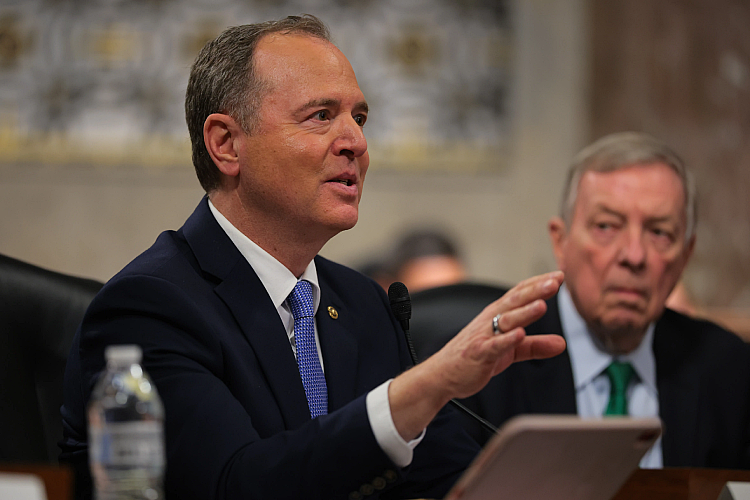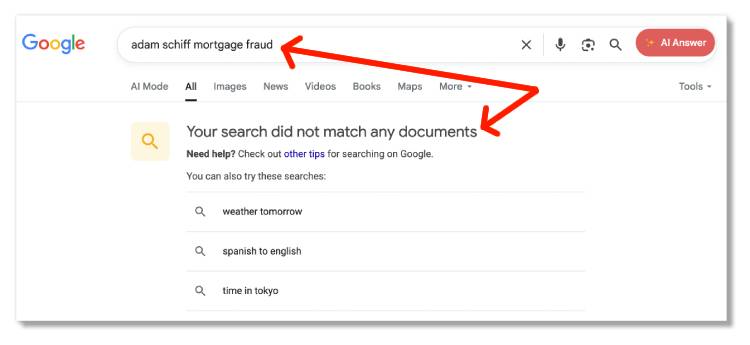
Executive Summary
Based on available information, the likelihood of Senator Adam Schiff being found guilty of mortgage fraud appears moderate to low, despite the criminal referral from federal housing authorities. While the allegations raise legitimate legal questions, several factors suggest that there will be significant challenges to a successful prosecution.
PJ Media: Is This the Smoking Gun That Will Send Adam Schiff to Prison?
The walls are finally closing in on Adam Schiff, and this time it’s not some manufactured scandal or political theater. On Tuesday, Fannie Mae’s Financial Crimes Division flagged Schiff for alleged mortgage fraud, and reports quickly confirmed that a criminal referral had been sent to the Department of Justice. According to a senior administration official, the Federal Housing Finance Agency is requesting a full investigation, and Schiff could potentially face criminal charges for each monthly mortgage payment he made using the fraudulent documentation.
The California senator who spent years weaponizing the justice system against Donald Trump now finds himself facing potential federal criminal charges for what could be mortgage fraud.
The facts are damning and remarkably straightforward. Back in 2023, reports surfaced that Schiff had claimed a $1.7 million Maryland home as his “primary residence” on federally-insured loan documents. This wasn’t some innocent paperwork error; it was a calculated move to secure a lower mortgage rate by lying about where he actually lived. The problem? Schiff has been a California politician representing Burbank since 2003, and you can’t hold elected office in the Golden State if your primary residence is actually in Maryland.
Background of Allegations
The Federal Housing Finance Agency (FHFA) has submitted a criminal referral to the Department of Justice regarding Senator Adam Schiff’s mortgage documentation, with allegations centering on his claiming a Maryland home as his “primary residence” on federally-insured loan documents while serving as a California representative.
Key timeline elements include:
- 2003: Schiff and his wife purchased the Maryland home for $870,000 with a Fannie Mae-backed mortgage of $610,000 at 5.625% over 30 years
- 2023: Initial reports surfaced about the residency documentation
- May 2025: FHFA Director William Pulte sends criminal referral to Attorney General Pam Bondi
- July 2025: Fannie Mae’s financial crimes division concludes Schiff allegedly committed mortgage fraud
Legal Framework and Potential Penalties
Federal mortgage fraud carries severe statutory penalties:
- Prison: Up to 30 years in federal prison and fines up to $1,000,000
- Additional consequences: Restitution payments, asset forfeiture, and permanent criminal record
However, in fiscal year 2021, only 58 mortgage fraud offenders were sentenced in the federal system, indicating relatively selective prosecution of these cases.
Prosecution Strengths
1. Documentary Evidence
Schiff is alleged to have falsified bank documents and property records to claim “primary” residences in two states and gained financial advantages
2. Video Statement
The PJ Media article highlights video evidence in which Schiff allegedly stated that his primary residence “always has been, always will be” in California, potentially contradicting his mortgage documentation.
3. Financial Benefit
The allegations suggest Schiff obtained favorable loan terms by misrepresenting his primary residence, establishing both intent and material gain.
4. Pattern of Behavior
The allegations involve “multiple mortgage applications dating back more than a decade,” suggesting systematic rather than inadvertent conduct.
Defense Challenges and Prosecution Weaknesses
1. Political Context
Critics have characterized this as “Trump’s vile, corrupt attack on Adam Schiff,” suggesting the case may be viewed through a political lens that could influence jury perceptions and prosecutorial discretion.
2. Burden of Proof Standards
Federal mortgage fraud requires proving:
- Materiality: The misrepresentation must be material to the loan decision
- Intent: Specific intent to defraud must be established
- Reliance: The lender must have relied on the false information
3. Statutory Interpretation Issues
The definition of “primary residence” can be complex, particularly for elected officials who maintain homes in multiple states for legitimate governmental purposes.
4. Prosecutorial Resources and Priority
Given the political prominence of the case and limited federal prosecutorial resources, the DOJ may face pressure to ensure an exceptionally strong case before proceeding.
Comparative Analysis
Similar Cases
Primary residence mortgage fraud cases typically involve:
- Clear intent to flip properties for profit
- Multiple fraudulent applications
- Significant financial losses to lenders
Schiff’s case differs as it involves long-term property ownership rather than investment fraud schemes.
Political Prosecutions
High-profile political prosecutions face additional scrutiny and require exceptional evidence standards to maintain public confidence in the justice system.
Likelihood Assessment
Probability of Conviction: 25-40%
Factors Supporting Conviction:
- Documented contradictions between loan applications and public statements
- Clear financial benefit from alleged misrepresentations
- Federal agency criminal referral with investigative findings
Factors Against Conviction:
- Political context may create reasonable doubt about motivations
- Complex legal standards for mortgage fraud in cases involving legitimate multi-state residency
- High burden of proof for intent in federal fraud cases
- Potential for plea negotiations or civil resolution
Conclusion
While the criminal referral and alleged documentary evidence present legitimate legal concerns, successful prosecution faces significant challenges. The case’s political context, complex residency questions for elected officials, and high federal prosecution standards suggest that while charges are possible, conviction is far from certain.
The outcome will likely depend on:
- The strength of documentary evidence beyond what’s publicly available
- The DOJ’s appetite for high-profile political prosecutions
- The ability to prove specific criminal intent rather than civil violations
- Jury composition and reaction to the political dimensions of the case
Assessment based on publicly available information as of July 19, 2025. Legal proceedings remain ongoing, and circumstances may change.
And then there’s this mysteriously Google search tidbit. Perhaps you can explain … I can’t.
.

